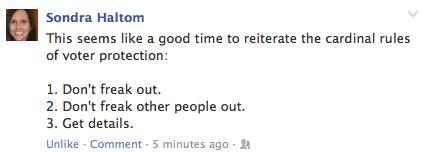Sondra Haltom, founder of Empower the Vote Texas, is correct when she reminds us that we simply cannot afford to freak out or to freak others out when dealing with the Republicans' new voter suppression law requiring photo identification to vote. As Texas Democrats help voters deal with the confusion and obstacles created by this unnecessary law that is being challenged in court, we need to try to focus on voter protection. What that means in practice is to not just get angry, but to get informed and to get active.
Since early voting began on Monday, stories regarding voters dealing with issues surrounding the new photo ID requirement have made news not just in Texas, but nationally. Earlier this week, Laurence O'Donnell interviewed Texas District Court Judge Sandra Watts regarding her experience voting under the new photo ID requirement in her own courthouse on Monday:
H/T franklyn for drawing this interview to my attention.
When she went to vote as usual, Judge Watts learned to her dismay that she would be required to complete an affidavit before voting because the name on the photo ID she presented—in this case, her valid Texas driver's license—is not identical to the name on the official list of registered voters (the name on her Texas voter registration certificate), but was determined by the election worker to be "substantially similar," apparently because the only difference is the middle name.
Judge Watts did complete the Similar Name Affidavit and was then allowed to vote using a regular ballot. Given that we're stuck with this Voter ID law for now, the law was applied fairly: Even though folks in the courthouse obviously know this judge, they still followed the law and required that she complete the affidavit before casting a regular ballot.
The next evening, O'Donnell followed up with an interview of Texas state Sen. Leticia Van de Putte and activist Sarah Slamen. State Sen. Van de Putte, who hadn't yet voted, thinks she "will be forced to sign an affidavit." She then explains that state Sen. Wendy Davis and other Democrats convinced Republicans to amend the voter ID bill, which requires that names match exactly, to allow voters to sign an affidavit if the names are "substantially similar":
Transcript here
Lots of voters have been telling their stories this week, and that's important. What often gets lost in the justified outrage over the photo ID law, though, is the next and arguably most important step: Educating voters so that, rather than give up because they are confused or think that attempting to vote is a waste of time because they'll just be turned away, they understand the new process and will be more likely to turn out to vote in spite of the Republicans' blatant voter suppression efforts.
So in the latter half of the interview, state Sen. Van de Putte directly addresses Texas women voters who may feel discouraged from voting by this photo ID obstacle:
Go vote. Make sure that you sign that affidavit. And if you can't, please sign that provisional ballot.Slamen asserts that voter education for women is "absolutely" necessary, as is voter ID education for millennials and Hispanics:It's important for you not to leave that voting site until you vote. That's the message we want to get out.
Please go vote. Please make sure that you do this. Don't let the Republican leadership that has been so misguided deter you from really exercising your constitutional right to vote.
This is especially important for all the new, young, millennial voters [...]. Hispanics in Texas are two times as likely not to have a driver's license, and student IDs will also not be accepted.In addition to the organizations Slamen names, informed bloggers can help to educate Texas voters as well. Please continue past the coiled ovaries to learn more.So, if a student has a concealed carry license, they could vote, but with their student ID, they wouldn't be able to. That's not something that your average college student, who probably hasn't voted that many times, will know.
So I think the Wendy Davis campaign, Battleground Texas, the League of Women Voters—these are all going to be really central to the voting education [...].
